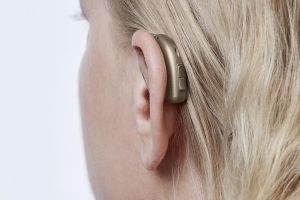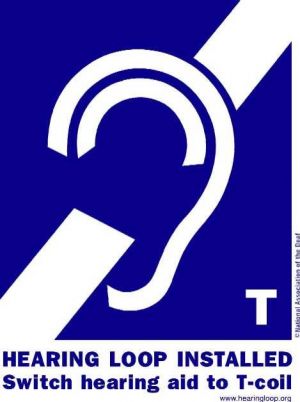|
www.HealthyHearing.com |
What are hearing loops and hearing aid telecoils?Hearing loops greatly reduce background sound for hearing aid users that have t-coils
Contributed by Debbie Clason, staff writer, Healthy Hearing If you wear hearing aids or are considering making that purchase soon, be sure to ask your hearing care provider about telecoil technology. These small copper coils have come standard in most hearing aid devices for nearly 50 years and, when used in tandem with a hearing loop, can dramatically enhance your listening experience in public places by piping sound directly to the hearing device. “Hearing aid microphones only work for a relatively short distance,” Juliëtte Sterkens, hearing loop advocate for the Hearing Loss Association of America (HLAA), said. “But telecoils and hearing loops give people with hearing aids better hearing, even sometimes better than those with normal hearing.” In fact, telecoils are so useful that Sterkens considers them one of the four essentialy hearing aid must-haves that all hearing aids should come with. What is a hearing aid telecoil?
telecoil. Many manufacturers use "T" in the name to indicate a device has a telecoil. (Image courtesy Oticon.) Telecoils, also known as t-coils, are small copper wires coiled discreetly inside hearing aids (see image here). They can receive electromagnetic signals from a variety of sources and are generally activated easily with the touch of a button. The technology is not new: Telecoils were originally embedded in hearing aids to pick up electromagnetic signals from landline telephones so that the hearing aid user could hear better on the phone, Sterkens said. “When the old Ma Bell telephones were in existence, they emitted lots of magnetic signals,” she explained. Today’s telephones are no longer a natural source of magnetic signals, but most still contain hearing aid compatible (HAC) equipment that generate a magnetic field to accommodate t-coil hearing aids. How do I get a t-coil hearing aid?Sterkens said although some hearing aid manufacturers have removed telecoils to make the devices smaller, the feature is still standard in most hearing devices. Hearing aid wearers desiring t-coil technology should request it from their hearing healthcare practitioner, who will provide the necessary programming and education. More about hearing aid types and styles and hearing aid technology. What is a hearing aid loop system?Hearing loops are assistive listening systems that exist in many public venues all over the world to assist those with hearing loss. This inductive loop system provides a magnetic, wireless signal that is picked up by hearing devices with telecoils. When hearing aid users are inside the loop and their t-coil setting is activated, any conversation being broadcast on the facility’s audio system — ie, a church sermon, classroom lecture, or stage performance — is sent directly to the telecoil in their hearing device. This feature not only extends the listening range of hearing devices, it also eliminates unwanted background noise, increasing listening comprehension and enjoyment. For example, this video demonstrates the difference a telecoil can make at a New York subway station. Which facilities have hearing loops?Thanks in large part to Americans With Disabilities Act (ADA) guidelines, an assistive listening system (ALS) must be provided in public “assembly areas with audio amplification” such as courthouses, movie theaters, live performance theaters, and public classrooms. The facilities can choose which type of ALS to install:
Sterkens said hearing loops are being installed with greater frequency in many newly constructed or remodeled airports as well as churches, public libraries and healthcare facilities. “They’re much more discreet than using other hearing assistive systems in public places,” she said. “Maryland just passed a law that mandates hearing loops be installed in state-funded projects. Indiana and Washington are gearing up, too. I think this is only the beginning.” New Mexico also recently signed a law requiring audiologists to educate their patients about t-coils. How do I find hearing loop systems near me?
In person: Venues that offer hearing loop technology will let you know they offer a hearing loop by posting blue signage featuring a white ear icon and the letter “T” displayed in the lower, right-hand corner (as seen at right). Via Google Maps: In partnership with HLAA, Google Maps now lets users find out in advance if a business or venue has a hearing loop. To use the feature, HLAA provided these steps in their article about the Get in the Hearing Loop partnership:
Apps: Many hearing loop-accessible venues are also listed on the following websites or smartphone apps:
How do I advocate for hearing loop technology?Sterkens encourages people to advocate for hearing loops in their community by using the information on the HLAA website. “The HLAA has resources for consumers who want to advocate for hearing loops,” she said. “Sometimes all it takes is one person to make it happen. Hearing loops beget other hearing loops. If you can help people hear that much better with the hearing aids they already have in their ears, it’s incredible. Everybody deserves to hear like that.” Can I install a hearing loop at my home?Yes, though it does require technical know-how. The HLAA provides this hearing loop installation step-by-step for DIYers. If you have untreated hearing lossIf hearing loss is preventing you from enjoying social activities, don’t stay home. Make an appointment with a hearing healthcare professional who will evaluate your hearing and recommend the best course of treatment so you can hear your best. For a listing of hearing centers and audiologists in your community along with verified patient reviews, visit our directory. Debbie Clason, staff writer, Healthy Hearing
|
Featured clinics near me
Earzlink Hearing Care - Reynoldsburg
7668 Slate Ridge Blvd
Reynoldsburg, OH 43068

Find a clinic
We have more hearing clinic reviews than any other site!


 Debbie Clason holds a master's degree from Indiana University. Her impressive client list includes financial institutions, real estate developers, physicians, pharmacists and nonprofit organizations.
Debbie Clason holds a master's degree from Indiana University. Her impressive client list includes financial institutions, real estate developers, physicians, pharmacists and nonprofit organizations.